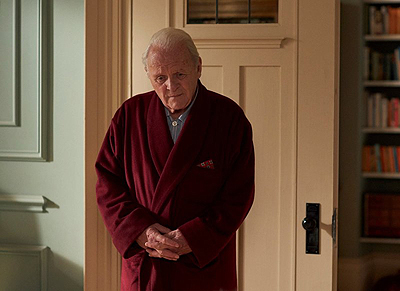 Anthony Hopkins (The Father)
Anthony Hopkins (The Father)
Losing the Plot: Explained
In The Father, a man (Anthony Hopkins) refuses all assistance from his daughter (Olivia Colman) as he ages. As he tries to make sense of his changing circumstances, he begins to doubt his loved ones, his own mind and even the fabric of his reality.
Writer and director Florian Zeller was very close to his grandmother. She was like my mother in a way, he says. She was very important in my life.
But when Zeller was 15, his grandmother started to experience dementia. It was a painful process ... to suddenly be impotent, he says. You know, you can love someone and you discover that love is not enough.
Zeller drew on this personal experience in his 2012 play Le Padre. The new film The Father is based on that play, and unfolds from the perspective of Anthony, who has dementia.
Chatting with both Zeller and Hopkins for a few minutes recently, I first wondered why Hopkins had taken on the role of someone living with dementia for his latest film? My initial reaction when I read the script was an immediate Yes. Same reaction I had to Silence of the Lambs. It was one of those scripts that I just thought I am so lucky to be offered this.
I phoned my agent immediately said Yes, I would love to do it. And so here we are. And my reaction to it all from the word go was one of confidence and a sense of I knew how to do it - because I am that old now. I am 83 and I just had a sense of it. It was easy to play.
On wanting the audience to relate to Colmans character, a daughter trying to care for her father? - Zeller: With someone like Olivia Colman, well, she has something magical; as soon as you see her, you love her and you feel empathy with her.
It is a painful situation because there is no absolute answer. You know, what do you do when when the people you love start to lose their bearings? Are you allowed to live your own life?
Is it the moment to take painful decisions such as going into an institution? And there is no clear answer. Art and especially cinema is not a place for answers, it is just a place for questions.
Hopkins: There is one moment after Olivia leaves the hospital and she says goodbye, she gets into the taxi, and she has got to face her life now.
And she is going to face the inevitability of her own demise and her own mortality. And there is something really heartbreaking about that.
On the freedom of not being in control? - Hopkins: I remember standing at my fathers bedside after he died and my mother was with him, with his body. And I remember thinking to myself: Yeah, you are not so hot either, because one day it will happen to you.This is life. And when death presents itself to you in those moments, well, we have no control and we do not know what is coming. We have no means of predicting anything.
And there is a great freedom in that, in realizing that we are inadequate, really. So, for me to play this part of it was easy and in a way, yes, life-changing. It has made me think even deeper.
Finally, on the effort to make the film mirror the experience of dementia? - Zeller: There are so many films about dementia and so I wanted that journey, in this film, to be more uncertain, more complex.
For example, the film starts as if it was like a thriller in a way. And we go through that labyrinth, you know, without being absolutely aware of where we are going.
I said that the film was like a puzzle, but a piece is always missing in that puzzle, you know, and it was a way for me to play with that feeling of disorientation.
Because I wanted the father to be not only a story, but also like an experience of what it could mean to lose everything, including your own identity.
Official The Father Movie Trailer
Back To Archives

